Tech for All
LIBRARY INFORMATION TECHNOLOGY ASSOCIATION (LITA) GUIDES
Marta Mestrovic Deyrup, PhD
Acquisitions Editor, Library Information and Technology Association, a division of the American Library Association
The Library Information Technology Association (LITA) Guides provide information and guidance on topics related to cutting edge technology for library and IT specialists.
Written by top professionals in the field of technology, the guides are sought after by librarians wishing to learn a new skill or to become current in todays best practices.
Each book in the series has been overseen editorially since conception by LITA and reviewed by LITA members with special expertise in the specialty area of the book.
Established in 1966, LITA is the division of the American Library Association (ALA) that provides its members and the library and information science community as a whole with a forum for discussion, an environment for learning, and a program for actions on the design, development, and implementation of automated and technological systems in the library and information science field.
Approximately 25 LITA Guides were published by Neal-Schuman and ALA between 2007 and 2015. Rowman & Littlefield took over publication of the series beginning in late 2015. Books in the series published by Rowman & Littlefield are:
Digitizing Flat Media: Principles and Practices
The Librarians Introduction to Programming Languages
Library Service Design: A LITA Guide to Holistic Assessment, Insight, and Improvement
Data Visualization: A Guide to Visual Storytelling for Librarians
Mobile Technologies in Libraries: A LITA Guide
Innovative LibGuides Applications
Integrating LibGuides into Library Websites
Protecting Patron Privacy: A LITA Guide
The LITA Leadership Guide: The Librarian as Entrepreneur, Leader, and Technologist
Using Social Media to Build Library Communities: A LITA Guide
Managing Library Technology: A LITA Guide
The LITA Guide to No- or Low-Cost Technology Tools for Libraries
Big Data Shocks: An Introduction to Big Data for Librarians and Information Professionals
The Savvy Academic Librarians Guide to Technological Innovation: Moving Beyond the Wow Factor
The LITA Guide to Augmented Reality in Libraries
Digital Curation Projects Made Easy: A Step-By-Step Guide for Libraries, Archives, and Museums
Library Technology Planning for Today and Tomorrow: A LITA Guide
Tech for All: Moving beyond the Digital Divide
Tech for All
Moving beyond the Digital Divide
Edited by Lauren Comito
Rowman & Littlefield
Lanham Boulder New York London
Published by Rowman & Littlefield
An imprint of The Rowman & Littlefield Publishing Group, Inc.
4501 Forbes Boulevard, Suite 200, Lanham, Maryland 20706
www.rowman.com
6 Tinworth Street, London SE11 5AL, United Kingdom
Copyright 2019 by American Library Association
All rights reserved . No part of this book may be reproduced in any form or by any electronic or mechanical means, including information storage and retrieval systems, without written permission from the publisher, except by a reviewer who may quote passages in a review.
British Library Cataloguing in Publication Information Available
Library of Congress Cataloging-in-Publication Data
Names: Comito, Lauren, editor.
Title: Tech for all : moving beyond the digital divide / edited by Lauren Comito.
Description: Lanham : Rowman & Littlefield, [2018] | Series: LITA guides | Includes bibliographical references and index.
Identifiers: LCCN 2018040684 (print) | LCCN 2018053082 (ebook) | ISBN 9781538122198 (electronic) | ISBN 9781538122174 (cloth : alk. paper) | ISBN 9781538122181 (pbk. : alk. paper)
Subjects: LCSH: Public access computers in libraries. | Internet access for library users. | Makerspaces in libraries. | Digital divide. | Computer literacy. | Internet literacy.
Classification: LCC Z678.93.P83 (ebook) | LCC Z678.93.P83 T43 2018 (print) | DDC 025.50285--dc23
LC record available at https://lccn.loc.gov/2018040684
 The paper used in this publication meets the minimum requirements of American National Standard for Information SciencesPermanence of Paper for Printed Library Materials, ANSI/NISO Z39.48-1992.
The paper used in this publication meets the minimum requirements of American National Standard for Information SciencesPermanence of Paper for Printed Library Materials, ANSI/NISO Z39.48-1992.
Printed in the United States of America
Foreword
Matthew Kopel
L ets start with the obvious: Leveling the playing field is a tremendously difficult task. It isnt just about having the access to the resources we need, or those well need tomorrow, but about ensuring that patrons have the language and context to be able to know what they need, and the librarians and community advocates to respond to and facilitate those requests and opportunities. All communities deserve a fair shake, meaning that there should be no limits on what patrons can ask for. Weve seen more and more changes in our libraries and community spaces as the world has changed around us, more resources online, more options for access to the resources we provide.
In some cases, there are champions who will push for progress and set the pace for change. Tech for All is a showcase not only of great ideas, but of folks who are working together to make those ideas responsive to requests, scalable to fit the communities being served, and representative of attainable ideals. We dont need The IT Crowd to show up, but to provide better training and professional development. Not all libraries will define the makerspace of their dreams in the same way, which means our makers and fabricators must take a broad approach to what those services might look like. Building web savvy library staff wont mean that everyone is a developer, but instead have a foundational knowledge complemented with robust, reliable broadband connections in order to help students, small businesses, and all other patrons be able to build and explore without restriction.
The folks whove contributed chapters to this volume are intelligent, courageous, and inspiring professionals. Ive had the privilege to work with several of them, and cannot express how excited I am for you to be inspired by them. They will share the ah ha! of using Linux instead of Windows when the use case permits, allowing for larger computer labs, refurbishing workshops and lending programs to meet expanded community need on a budget. They will make the parallels more clear between patron training programs and the professional development needs staff face across our institutions and spaces. These folks are working in different environs, with different funding levels, different local needs, and different amounts of buy-in (both internally and externally). Theyre folks who came into this arena of work with a plan, and folks whove needed to make up the plan as they went along. Theyre people who care enough not just to do the work, but to bring it to the table for discussion and criticism, which is a tremendous challenge in itself.
And then we have you, the person who picked up this book. Maybe it was at a booth at a conference, or perhaps youre burning some time while monitoring the computer lab. Perhaps youre reading this for your MSLIS, or youre a seasoned veteran of the library looking for resources to fit the chorus of calls from your patrons for new programs and opportunities. Perhaps you think this is important. I really hope that you do, because in the chapters of this book youll find not just concrete examples of folks doing the work and helping their whole libraries learn, but youll see the fomentation of the sea change many of us came to the profession to help along.
We stand on the shoulders of giants and luminaries, some whove been around and others who have come in as disruptive forces for change, answering the call and setting the bar. The editor of this volume was a major inspiration to me when she hacked together whereinqueens.org. When I see Jessamyn Wests TILT email pop into my inbox, I drop everything, go into lockdown, and begin to prepare myself to learn. When I sat with Carrie Coogan of Kansas City Public Library and Elizabeth Lindsay of Byte Back on a panel, I did my best to shut up and appreciate that I had the best seat in the house to hear about how the pros get the work done. When Nicole Umayum at the Arizona State Library tells me about progress in their hotspot program, or when Sandy Tharp-Thee sends me pictures of the new computer labs shes set up for tribes in Oklahoma, I am reminded of what were all really here for.
Next page
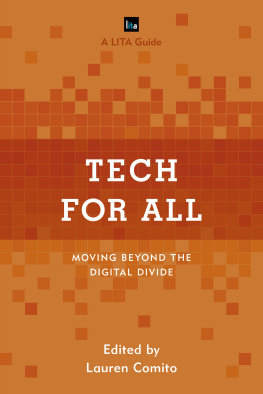
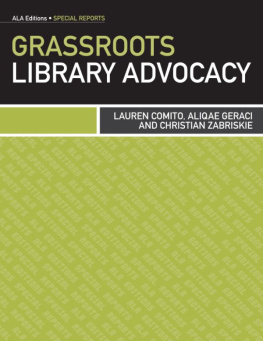
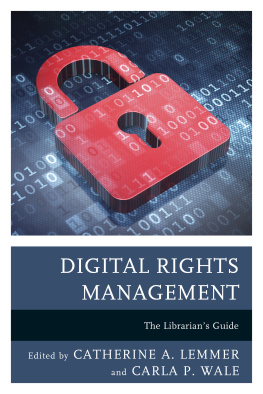


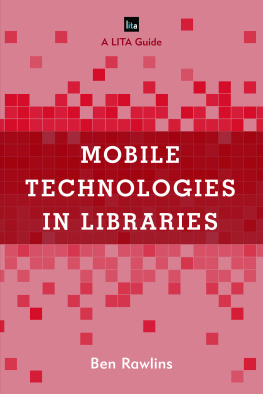
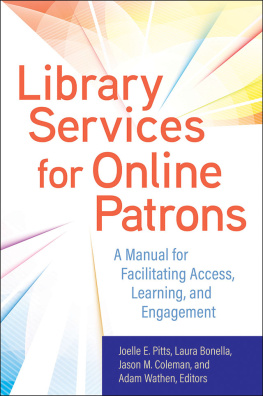
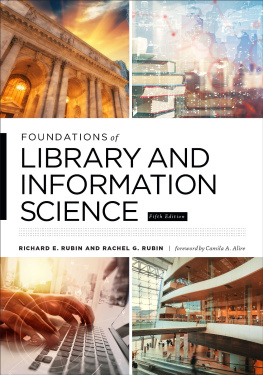
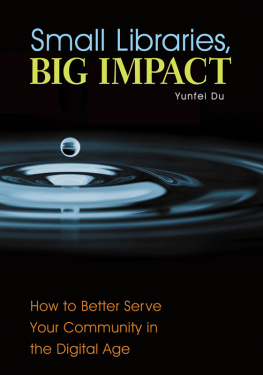
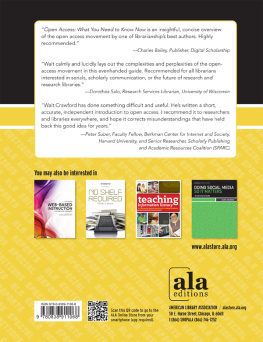
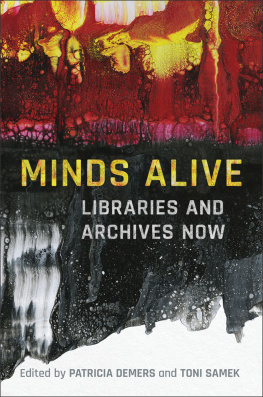
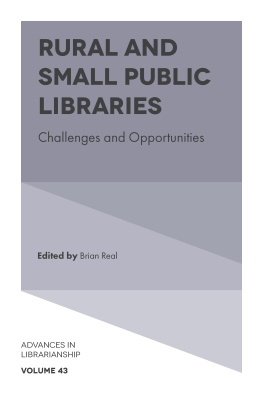
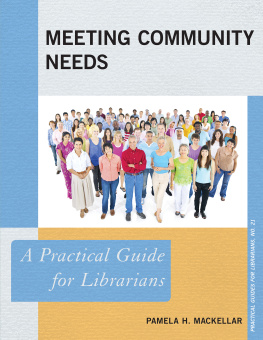
 The paper used in this publication meets the minimum requirements of American National Standard for Information SciencesPermanence of Paper for Printed Library Materials, ANSI/NISO Z39.48-1992.
The paper used in this publication meets the minimum requirements of American National Standard for Information SciencesPermanence of Paper for Printed Library Materials, ANSI/NISO Z39.48-1992.